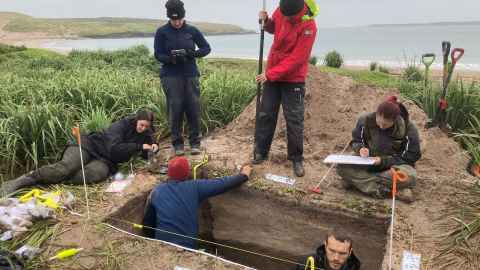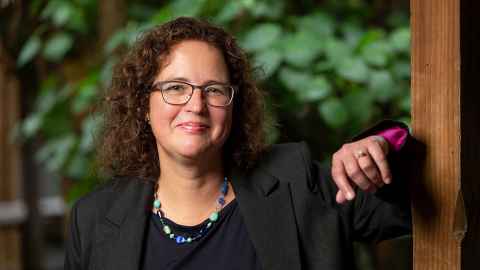Why do people do what they do? Anthropologists find out
23 July 2024
Anthropology, the study of human societies and cultures, continues to fascinate students and is always a highly ranked subject at the University of Auckland. What’s its secret?

A culture of collaboration and socially relevant research across the four fields of anthropology is a secret of the subject's consistently high ranking and popularity at Waipapa Taumata Rau, University of Auckland, believes Susanna Trnka, a professor of social anthropology.
“We are notable, I think, for the fact that across archaeology, social anthropology, ethnomusicology and biological anthropology we have teams researching and co-writing together.
“Our work also picks up on socially topical issues like Covid-19, youth mental health and popular music, as well as the fact that we have rich archaeological sites in our own backyard in places like Ahuahu (Great Mercury Island), where ancient Māori remains continue to be discovered, as well as in the wider Pacific in places like Sāmoa, the Marquesas and the Auckland Islands, where we have made significant recent discoveries," she says.
Trnka’s own Marsden-funded research, about to become a book published by University of Pennslyvania Press, focuses on the concept of ‘healthisation’, a term coined to explain the way many young people are now thinking about their health.
“Talking to 235 New Zealanders aged between 14 and 24 for this book after the worst of Covid," she says, "we discovered that whereas our generation might have done a lot of things without thinking about the reasons, like wearing lipstick or having lunch with our friends, young people now seem to be viewing these things in a health context.
"They spoke about wearing lipstick ‘because it makes me feel good, and that’s good for my mental health,’ or ‘I feel bad if I don’t get out and spend time with my friends, and that’s not good for my mental health.”

She believes this change could be partly driven by the lockdowns enforced by Covid, but not entirely.
“The lockdowns compelled young people to reflect more on their mental health and on their ‘social health’ or their relationships with others,” says Trnka.
“Feeling dislocated and ‘suspended in time’ also encouraged young people to think about how they envision a meaningful life and how to find balance in their lives, instead of just pushing themselves to achieve; they already had all of these concerns prior to the lockdowns, but the lockdowns just threw them into stark relief.”
Another current project for anthropologists at the University is called 'One Health', which focusing on the relationships between humans, animals and the environment.
“To understand how diseases emerge and persist, we have to consider the institutions and networks that shape agriculture, animal husbandry, resource extraction and distribution”, says Professor Judith Littleton, a biological anthropologist.
Littleton and her colleagues in archaeology are using techniques such as ancient DNA, stable isotope (non-radioactive forms of atoms) and ancient protein analyses, which, alongside the study of disease in past human populations, allows them to trace diseases through time, placing humans, animals, and pathogens within local and regional environments and economies.
"Our goal is to trace the ebbs and flows of vulnerability and resilience and the conditions that promote either," she says.
Watch Professor Judith Littleton talking about how diseases are created in particular bodies.
Meanwhile in the field of ethnomusicology, senior lecturer Sunhee Koo’s research centres on East Asian performing arts, with particular reference to the dynamics of ethnicity, nation and identity.
She has written on K-Pop, the impact of the Korean Wave or Hallyu, a cultural phenomenon that has seen the dramatic rise of South Korean popular culture since the 1990s, and the music of Korean people in China and Japan, where they are an ethnic minority.

The role of an anthropologist is to understand how people live in societies, how they organise themselves, how they make their lives meaningful, and how that changes over time, says Trnka.
“In other words, why do people do what they do?”
Anthropology again featured in the top 50 of the 2024 QS subject rankings at =48, with archaeology jumping up to =39 from 46 in 2023.
Watch Associate Professor Ethan Cochrane talk about his team's recent discoveries in Sāmoa.
Media contact
Julianne Evans | Media adviser
M: 027 562 5868
E: julianne.evans@auckland.ac.nz